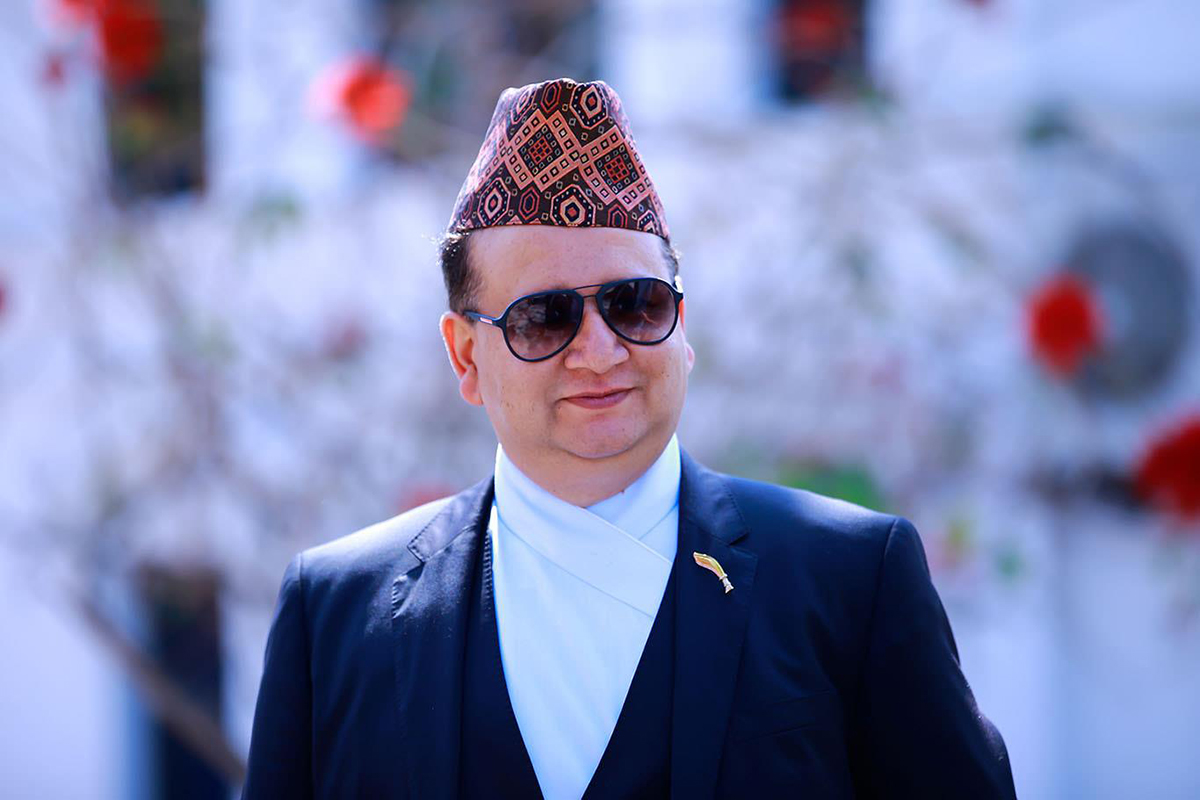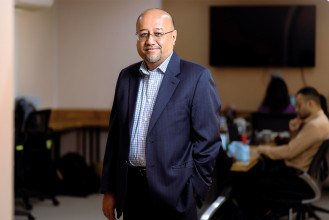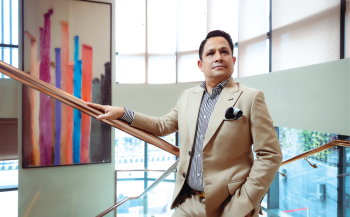
Prabin Bahadur Panday is the Executive Director of Shangri-La Hotel & Resort. He is also Executive Member of the Hotel Association Nepal (HAN), and Co-chair of the Hospitality Committee of Pacific Asia Travel Association International. From 2002-2006, he served as Chairman of PATA, Nepal Chapter.
The beginnings
This entrepreneurial story all started with Shyam Bahadur Panday, Founder and Chairperson of Shangri-La Hotel & Resort, Nepal and father of Prabin Bahadur Panday.
Shyam Bahadur Panday was working as Under Secretary at the Ministry of Defense during the 1960s. Not many people know this but he comes from the lineage of Kalu Panday, a great warrior in the annals of Nepali’s history. Besides, Shyam Bahadur Panday’s grandfather had fought in WWII. Likewise, his father was also in the army. However, he chose the path less travelled. He quit his government job and got immersed in materialising James Hilton’s notion of an idyllic place, ‘Shangri-La’.
But it was no easy feat. The story of a Nepali entrepreneur during the early 70s, fresh out of government service and drunk on the concept of creating a Shangri-La appears romantic, but it would be a journey of turmoil, contemplation, doubts, challenges, shortcomings, sweat and hardship.
Prabin Bahadur Panday, the younger son of Shyam Bahadur Panday, says, “My father didn’t have enough resources to build a hotel. He met Desmond Doig who came to Nepal after the British left India. Desnand came to Nepal as he believed the country with the majestic Himalayas was nothing short of Shangri-la.” It was in fact Doig who injected the thought of Shangri-La into the senior Panday.
This story is a testament to doers who do not give up on their dream. Most times great ideas perish without seeing the light of the day. It wasn’t so for Shangri-La Kathmandu which came into operations in 1979 with 50 rooms.
Reminiscing over its rich history, Panday says, “In the 70s, the expatriate community was very thin. Legendary people like Desmond Doig, Boris Lissanevitch, Tenzing Norway were frequent guests at our property. Edmund Hillary and Tenzing Norgay were patrons of our place.” Boris Lissanevitch had opened the Royal Hotel in Kantipath in 1954 which now serves as the Election Commission Office and was the one to propose the government to open up Nepal to tourists.
Even though Doig was hired by Shyam Bahadur Panday to work at his hotel, his involvement surpassed the job description of a consultant so much so that the Pandays call him family. “He did not just contribute through his designs, he was helping us with everything from guest relations to marketing and branding.”
Present Times
While its colourful history transports one in time, one can’t help but question whether Shangri-La today still retains its essence of paradise? Panday emphatically responds with a yes, saying, “The biggest strength of Shangri-La is that even in a urban setup we provide our guests with ample space.”
Over the years, the hotel has expanded to 100 rooms of different categories and services to fulfill the requirements of a five star property. Today, deluxe rooms, suites, club rooms, a club lounge, restaurants, coffee lounge and apartments, spa, in room amenities, services and luxury and sophistication await guests.
Since the 70s, Kathmandu and other tourist hot spots have seen a rapid increase in the number of hotels, guest houses and resorts. More people have turned tourism entrepreneurs, investments are high, and the country is also seeing the entry of new international chain hotels. Panday observes, “There’s always additional business when international chain hotels come in. However domestic hotels like ours have history. It becomes a part of the Nepalese heritage, and we are viewed as a concept hotel. We are not a hotel which has volume. We are looking at smaller number of rooms. For example, the upcoming resort at Begnas won’t have more than 36 suites. Having said that, we are looking at high-end luxury business which will bring in more revenue into the country. We are not competing for numbers, but for the quality.” He underlines, “A hotel must have some sort of story.” And Shangri-La Hotel & Resort has this in plenty.
Breathing life into stories, Shangri-La Kathmandu has dedicated two of its suites each to Sir Edmund Hillary and Tenzing Norgay Sherpa. “We are lucky enough to get their consent to dedicate our suites.” The Tenzing Norgay suite has already been inaugurated, but the official opening of the Edmund Hillary suite is awaited. “They have already done the inspection. Peter (Edmund’s son) was here for a brief time but unfortunately he was here for a different purpose, but he said he is coming back. And we have done the required correspondence.”
After these two are the Desmond Doig and James Hilton suites, for obvious reasons. There are also plans to dedicate a suite to Toni Hagen, the famous geologist and author. The Shangri-La Village Resort in Pokhara stands at the very spot from where Hagen had taken his famous panoramic shots of the Annapurna range. “He helped us to find the location. That’s why we will dedicate one of our suites which we are yet to build.” Shangri-La Village has been designed to cater to the resortesque feel, and as more of a leisure hotel.
Since change is the only constant, every five years, they renovate and reinvest in the hotel. “It’s like opening a brand new hotel.” Along with Prabin, his elder brother Prasidha Bahadur Panday, Managing Director overlooks the functioning of the hotel. “Our father has given the responsibility to me and my brother. We always have our father’s blessings.”
Business as it is
The Pandays have ensured that every little aspect of the hospitality business is looked into. Shangri-La Hotel & Resort hosts its annual Platinum Awards night as a gesture to felicitate travel partners. The staff are called Team Shangri-La. “We call our travel agents, partners and supporters, ‘Friends of Shangri-La’. The Platinum Award is a part of our journey with our friends to appreciate their contribution,” briefs Panday.
In a business journey, contentment leads to mediocrity. In fact, it’s all about exploring, expanding and enthralling. With leading properties in Kathmandu and Pokhara, business expansion is now focused in the Begnas area. They are going to name it the Lost Horizon Resort. “It is going to be an international standard deluxe resort. We have already worked on the feasibility study, road access, and now work is being executed phase wise.” There are plans for three projects in the next 10 years: Begnas, Chitwan, and Shivapuri.
Often on entrepreneurial journeys, people get caught by the need to found or lay claim to creating a business, but Panday is made of a different mettle. He says, “Shyam Bahadur Panday is the creator, the founding chairperson of the hotel. He was an entrepreneur. I am not an entrepreneur. I am a businessman. As a son, I have taken over. My role is to make sure that the hotel makes substantial profit so that the hotel can expand and maybe someday go international as well. And we can”.
Wearing Many Hats
Panday’s time is not just consumed by the family business; the man wears several hats. He is currently serving as Executive Member of Hotel Association Nepal (HAN) and is Co-chair of the Hospitality Committee at Pacific Asia Travel Association International (PATA). During 2002-2006, he served as Chairman of PATA, Nepal Chapter. “I am also part of the government’s committee now. They have appointed me in the Tourism Ministry’s Standardisation Committee where I am the only member from the private sector. We have a subcommittee where we have experts, almost 30 people from different hotel management schools, principals, general managers from 5 star hotels.” His work entails a lot of travel and gives him the required insight to translate what he learns to benefit his business and the industry. “That’s where I develop a lot of connections and kmowledge of global trends. We visit a host of countries and see how they are developing. Now we want to standardise non-star properties. At present hotels are of two kinds: the ones that fall under 1 to 5-star category, and then there is the non-star. We have thousands of hotels across the country who like to call themselves non-star. These non-stars could be 4 star, 3 star, 2 star, a lodge or B&B.” Essentially, depending on their standard, if these establishments have a standard of 1 to 5, they will automatically get the standard that the government offers. He elaborates, “We are trying to categorise and convert the non-star. Our job is to categorise a minimum standard for the smaller category of hotels which could be B&B or lodge. Besides, we have a diverse kind of geography, so we are also making a policy which will cater to that level of hotels also. That is one of my jobs and I am already working on it with my team.”
Tourism
According to Nepal Tourism Board, the country opened doors to more than a million tourists in 2017; Panday says that even a million is a negligible figure. “I would not call it tourism because if we compare it with our neighbours, if we compare it with tourism in Thailand, they are almost close to 200 times more. The reason for this is that we are always targeting Indian tourists or neighbouring tourists as per our present capacity of infrastructure.” Even though developments on Bhairahawa and Nijgadh airports is regularly reported in the media, for the present, we have just TIA.
Panday however sees a glimmer of hope in the railway projects. “Once there railroad connection between two countries either with China or India, then the number of tourists will catapult by manifolds.” He further adds, “We are hopeful that with a stable government, infrastructure projects of road, trains, and the airports will start and be completed on time.”
Interestingly, many countries have converged their focus on high-yield tourists rather than back-packers. But according to Panday, it’s very difficult to say what kind of tourists we should promote, or who should be coming. However he believes that any accommodation meant for tourists should be standardised. “I think unorganised accommodation for international tourists is the real threat to the industry,” he emphasises.
In his view, another problem that has seeped into the hotel industry is unhealthy competition. According to him standards of some hotels are even below the minimum standard set by the country. “This way nobody is benefitting. There is zero contribution to state, federal or local governments. Hoteliers themselves are suffering. Competition in tourism is so rampant that some establishments might be charging less than the cost of their own operation,” he shares, adding, “In the process of such competition, the hotel industry should not collapse. It has to sustain. I question the survival of an entrepreneur in places like Pokhara lakeside or Sauraha where businesses collapse overnight. Either the brand changes or the ownership does. Tourism is a long term investment.”
Nepal is also renowned for its hospitable people. The role of human capital in the development of tourism sector, and by extension, of the country cannot be stressed enough, shares Panday. “Disciplined manpower is very important for the hotel industry because people come to Nepal as we are seen as hospitable people. We must retain this value”.
Shaped by history
Panday exudes passion when talking about Shangri-La Hotel and Resort. “The fact is,” he says, “I was born with the hotel. My entire childhood I have spent with legendary people. I was trained by them. They did not just shape the hotel, they also shaped me.”
“Our father was an investor; Desmond Doig, along with his team, was looking after the management. That’s how we started. As an owner managed hotel, that’s why we are different from the generic or formulaic hotel. Even though I am an owner, there are certain issues I handle myself.” One can find him greeting and meeting with guests. He also likes to interact with the travel agents. His argument is that when you are running a property, you cannot afford to keep barriers. “Communication is paramount,” he says. The owner’s direct involvement is in every aspect of the establishment. Some call such micro involvement of a leader ‘unnecessary’. But there is no one-size-fits-all when it comes to leadership. “If you did your studies abroad, came back, got your own room, and keep a couple of computers, sit on the top, call your managers for a meeting and decide, I don’t think that works in Nepal. Our country does not work that way. Something that is briefed in the meeting will be completely different in reality. If you own a place, you have to do everything. Tomorrow, if need be, you should be the doorman. We are part of this property and we are here to serve.”
However, this is not to say that the brothers have not nurtured interests elsewhere. “We have expanded in other areas also. We have some other investments as well. Both my brother and I have investments in real estate, in trading, and some in the banking and insurance sectors as well.”
Panday returned home from the United States in 1996. He obtained his BBA with a minor in Computer Science at Lincoln Memorial University, Tennessee. As keepsake from his early years, he still has the cheque for $240 that he earned from his pizza delivery job at Papa Gino’s Restaurant. Panday had considered a career in IT post college but the pull of the Himalayas proved stronger. He shares an uncompromising passion for the business his father started and both brothers today nurture. Would he have it any other way? We guess not. Here is one fulfilled businessman ready to expand and grow his business but always drawing from his rich legacy.





-1757917838.jpg)